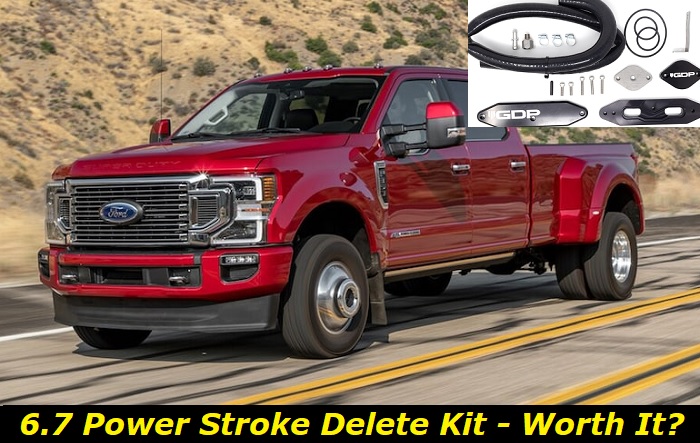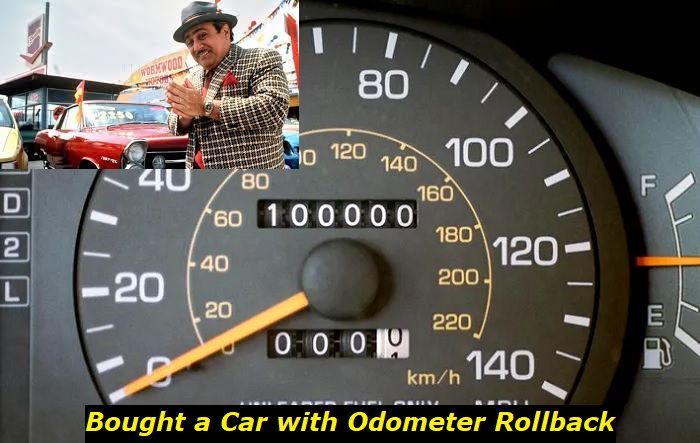2011 saw the replacement of Ford's 6.4L Power Stroke with the 6.7L Power Stroke due to more stringent emissions regulations for diesel trucks. It has undergone three generations since its debut, each of which has become more environmentally friendly. The 6.7L Power Stroke emissions systems, on the other hand, are prone to malfunction and are very expensive to fix.
Key features and my opinion about the engine
- Production years:2011-2016
- Average lifespan of 6.7 Power Stroke:240,000-270,000 miles
- Fuel supply type:Common Rail
- Power range:330-475 hp
- Fuel efficiency:average
- Engine block material:cast-iron
- Engine reliability score:medium
- The most common problems:turbo problems, cooling system issues, weak sensors, CP4 pump problems.

There's also the belief that removing the emission systems can provide you with some additional gas mileage. Although there's no substantial proof of this, and it might be conflicting, drivers who delete their trucks often have shared their experience with it, especially with 6.7L Power Stroke.
For these reasons, it is common to delete the 6.7L Power Stroke DPF system. And interestingly, the 6.7L Power Stroke, like its predecessors, responds well to a good tune. Tuning these vehicles is focused on overcoming two major obstacles: new technology in truck engine management and more stringent emissions requirements.
This article will walk you through the DPF system, the best delete kits for your 6.7L Power Stroke, and some concerns you should have when you tune your truck. This guide was created to highlight the best options for deleting the DPF and EGR on your truck and the best option for a tuner that can also handle the ECM. It only takes a few parts to begin exploring the vast new world of power and economy that tuning your 6.7L Power Stroke can provide.
To clear this from the start, if you live and drive in the United States, these modifications are only for off-road use (or illegal use, let's say). However, if you live in a country where emissions regulations are not as stringent, you will be doing your truck a disservice if you do not remove the dead weight.
The 6.7L Power Stroke DPF System
The acronym for DPF is diesel particulate filter. When diesel is burned, diesel particulates are released into the exhaust system. Diesel particulates are dust pieces made up of different chemicals that are bad for the environment and your health if you breathe them in. Diesel particulates are gathered and burned in the DPF during a regeneration cycle.
In fact, the DPF is a component of the 6.7L Power Stroke exhaust system's emissions system. The first is the diesel oxidation catalyst (DOC), which is directly connected to the downpipe and serves as a catalytic converter. The selective catalytic reduction (SCR) system is the second system. Using diesel exhaust fluid, the SCR system transforms nitrous oxide into nitrogen gas and water vapor with the diesel exhaust fluid (DEF). The first two systems burn down the exhaust gases as much as they can before they enter the DPF system.
To clear it, the DPF is only one part of the exhaust gases cleaning system. But over time, it gets clogged and needs replacement or cleaning. This is why a lot of people are interested in deleting this filter at all to avoid any problems with power and gas mileage in their cars.
Another notable emissions system is the EGR system. Exhaust gas recirculation, or EGR, takes place just before the gas enters the exhaust system. After combustion, the EGR system aids in the recirculating exhaust gas. In order to further reduce emissions, the exhaust gas is returned to the intake system and reburned. To remove the EGR, you'll need a different tool, and for full tuning, you'll also need the ultimate delete kit.
Best Delete Kits For 6.7L Power Stroke
So, what we want to say, it doesn't matter what brand of the delete kit you want to buy. It matters that this brand is American, not Chinese. Unfortunately, companies from overseas can't understand the needs of the powerful Power Stroke diesel engine, so their kits are too weak for the 6.7 PS.
Also, it matters if this kit is full for your work. We don't recommend completing delete tuning on your own, without any professional help. This may lead to problems with your engine, ECU, sensors, and other important parts. We highly recommend finding a good specialist who can easily do the job for you.
You may buy a ready-to-use kit which is the easiest thing to do. But bear in mind that kits priced at less than $300, we don't recommend it.
Also, what you will need to buy is a tuner or a special service in your favorite repair shop to tune your engine. You may choose any tuner that suits the 6.7 Power Stroke. But we believe the best thing to do is to let a specialist tune the ECU.
Installing an additional tuner to your vehicle may result in problems in the future. Sometimes, this may lead to huge problems with wiring, ECU, and other parts. Especially, if the tuner won't be installed properly.
By the way, there are kits for DPF delete and for EGR delete. And they differ much. You should understand what exactly you want to delete. Keep in mind that deleting your DPF filter may result in your car not passing the fog test.
So, the delete tuning is the procedure that should be completed professionally. And this is what we recommend in this section. It doesn't matter much which delete kit you'll buy, but you should concentrate your attention on American-made kits.
Concerns For Delete Tuning
It's pretty much a popular opinion amongst truck owners that deleting your vehicle helps it become more efficient while avoiding repair costs that could arise from the emission system components. Deleting existed before 6.7L Power Stroke and doesn't seem like a culture that will stop in the nearest future.
These emission systems were created to help control and recycle pollutants from heavy-duty vehicles. However, the burden it becomes on truck owners has become overbearing, leading to huge cost implications. Deleting can be legal or illegal, depending on what regulations in your country says.
With pollution increase being the first concern, you'll also need to worry about if deleting your truck is legal in your country. Countries like the United States say it's 100% illegal to tamper or modify the emission system of your truck in any way, but most people believe these regulations hold water in some states more than others, and as such, deleting or tuning is still a big deal for truck owners.
Another concern to have when deleting your truck is it becomes less valuable. Although it is generally agreed that deleted vehicles are more efficient than trucks with intact emission systems, the dealership would not hesitate to underpay you when you eventually decide to sell your truck.
The valuation issue is something to pay attention to because when you ask most truck owners to consider the resale value, they tell you they are probably not selling anyway, only to try to sell for a new one some years later. A piece of very useful advice for these cases is to keep your emission system components after tuning so that you can easily refix them in case of a resale or a legal issue.
Emission system components have a market of their own, but they are hugely underpriced anyway, so it would be worth it not to sell your components after deleting them. Deleting also forfeits the warranty on your truck, and it's definitely a concern if you didn't know.
Conclusion
The above are major concerns about deleting your DPFs and EGRs. Conclusively, there are pros and cons to deleting these units and getting rid of the emission systems and you can easily decide now on what to do based on the information provided in this article.
We also hope we have been able to help you curate the best delete kits for your 6.7L Power Stroke. We listed the best delete kits we could find judging from real-life testing and user reviews.
About the authors
The CarAraC research team is composed of seasoned auto mechanics and automotive industry professionals, including individuals with advanced degrees and certifications in their field. Our team members boast prestigious credentials, reflecting their extensive knowledge and skills. These qualifications include: IMI: Institute of the Motor Industry, ASE-Certified Master Automobile Technicians; Coventry University, Graduate of MA in Automotive Journalism; Politecnico di Torino, Italy, MS Automotive Engineering; Ss. Cyril and Methodius University in Skopje, Mechanical University in Skopje; TOC Automotive College; DHA Suffa University, Department of Mechanical Engineering






Add comment